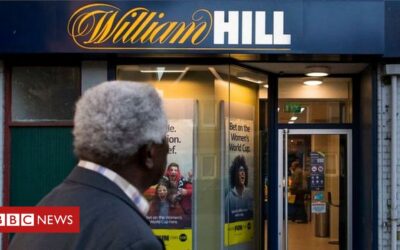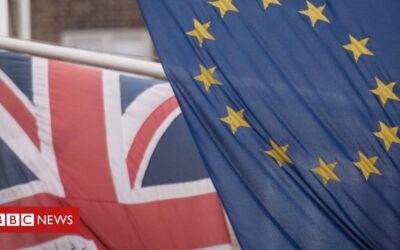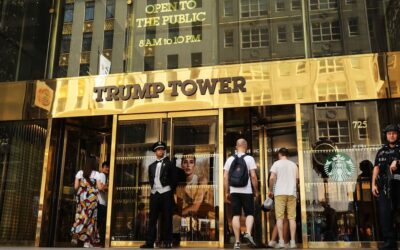By Cristina CriddleTechnology reporterRelated TopicsCoronavirus pandemicimage copyrightCourtesy of PradaFashion labels are designing outfits for video calls during the coronavirus pandemic.A “waist-up” focus has been noticed at both Milan and London Fashion Weeks, with detailed necklines and relaxed trousers.Prada placed its logo near the collars of its tops, and featured large coats pulled around shoulders like a blanket.It said it was not inspired by Zoom, but by the “contemporary human relationship with technology”.”Fashion is about reacting to reality,” said Miuccia Prada, head designer of Prada, at its virtual Milan fashion show. “During lockdown, I realised how important technology is and how it is impactful for us, and in some ways, an extension of ourselves.”image copyrightCourtesy of Prada”The tunic tops and roll necks, with the brand’s famous triangle logo blown up and placed directly below the neckline, will certainly catch the eye of your fellow Zoomers,” Jane McFarland, fashion director at The Sunday Times, said of the collection.”This year has been all about ‘waist-up dressing’. Having spent a lot of time on video conference calls, the top half of our outfit has become significantly more important than our bottom half.”Luxury fashion sales worldwide are forecast to fall by around 35% this year, due to shops closing and lockdown, analysis by the Boston Consulting Group suggested.Clothing sales in the UK plummeted by 34% in March, figures from the Office for National Statistics (ONS) show, as the industry struggles to attract customers.But fashion is reflecting history and the economy through these clothing trends, said Lynne Coleman, textile expert.”Designers are thinking about how we are living our lives. That’s why you see logos appearing in places you haven’t seen before,” she added. “We’ve been stuck inside for so long now and we want to express ourselves.”Fashion critics have noted jewellery has increased in popularity, while sales of handbags and shoes are down.”Moving the logo up to the neck is a good way of keeping your brand out there and making a fashion statement,” said Deborah St Louis, founder of Fashions Finest, which represents emerging designer labels during London Fashion Week,”People still want to appear professional, when working from home especially, but now we see a shift towards a more casual relaxed look.”image copyrightARMANI PRESS OFFICE HANDOUTAt Milan Fashion Week, designers also seemed influenced by remote working, with a trend for flatter shoes with a small heel, elasticated trousers, matching silk sets and pyjamas.”I’ve never seen so many elastic and drawstring waists in my life,” said Lauren Indvik, fashion editor at the Financial Times. “All the stylists are talking about ‘waist-up’ dressing, because that’s all everyone sees these days.”They have to inspire people to buy clothes, and there aren’t social occasions to dress up for, so maybe luxury at home is the new focus.”Outside of leading fashion houses, smaller designers have also focused on comfort at home with their new ranges.image copyrightValentina Karellas”I have created a cashmere collection, focusing on home comforts and pieces that have bold colour touches, especially from the shoulder up,” said fashion designer Valentina Karellas. “I realised over the pandemic a lot more people were doing a lot more self-care, but still wanted to be stylish for their work or social calls.”She has designed scarves, beanie hats and leg warmers, inspired by staying at home in lockdown.”Clothing has always been used to signify status and social standing, which is difficult to manifest now that we have moved much of our interaction online,” said Sonal Keay, founder of fashion brand This Is Silk.”The clothing industry has suffered from the pandemic, as people realised that they do not need to wear formal clothes as much.”image copyright@Elfa_inLondonMrs Keay says she’s seen an increase in demand for silk hair wraps – fabric used to tie up wet hair while it dries after showering.”Sales have skyrocketed and people keep sending me snapshots of themselves on Zoom calls, wearing these wraps. It reduces frizz and is an art deco, glam statement.”Related TopicsMore on this story
BBC Business News Articles
US squeezes China's biggest chip-maker SMIC
By Leo KelionTechnology desk editorimage copyrightSMIC/Getty ImagesThe US Department of Commerce has written to American suppliers of China’s biggest chip manufacturer, warning them of “unprecedented risks” that their products could be used by the Chinese military.The letter reminds the firms they must apply for licences to ship controlled items to Shanghai-based SMIC.But it does not appear that Washington has decided whether or not to add the firm to a trade blacklist.SMIC has denied any military links.And it said it had not received any formal notice of new restrictions from the US.But the latest action caused Semiconductor Manufacturing International Corporation’s shares to drop about 7% in Hong Kong trade. The fall followed a steeper decline earlier this month when the Pentagon first revealed it had proposed tougher restrictions against the business, including adding it to the government’s Entity List. That would prevent any company selling goods or services to SMIC that involved US intellectual property without first getting special permission.Such a step has already been taken against SMIC’s biggest client – Huawei – which has caused major disruption to the telecoms kit-maker’s business.Chinese state media had previously reported that SMIC was among many companies that had requested a US licence to continue supplying Huawei.But one industry analyst suggested the latest move indicated the US was increasingly focused on SMIC itself.”Denial of US semiconductor manufacturing equipment would put SMIC at a severe disadvantage, because most of that technology comes from American sources,” explained Jim Tully.”China could aim to become self-sufficient in these technologies over the longer term, but it seems to me that it would take 10-plus years to do so.”And in the short term, the equipment and related software SMIC already uses still needs ongoing support and maintenance from its producers.”This has led to speculation that SMIC’s survival may now be at stake.Blocked saleSMIC was founded in 2000, and has since become the most prominent chip-making foundry in mainland China.Until recently, it was viewed as being a beneficiary of rising US-China tension because it was expected to benefit from Beijing’s drive to make the country’s tech sector self-sufficient.The firm has raised close to $10bn (£7.7bn) this year via a share sale and other means to expand its operations.In addition to Huawei, SMIC’s clients include lesser-known Chinese chip designers including Gigadevice and Unisoc, as well as international companies including Qualcomm and Broadcom.However, its most advanced products are said to lag two generations behind what rival manufacturers – including Taiwan Semiconductor Manufacturing Company (TSMC) and South Korea’s Samsung – are capable of, because SMIC cannot currently make transistors as small as they can. This means its products are not suitable to be the state-of-the-art processors in the latest smartphones or other advanced gadgets.The reason for this is in part due to existing restrictions Washington has imposed on the firm.At present, the only way to make the most advanced logic chips is to use equipment made by a Dutch company, ASML.image copyrightGetty ImagesSMIC ordered a $150m lithography machine – which uses lasers focused by giant mirrors to print miniscule patterns on silicon – from ASML in 2018. But Reuters reported the White House convinced the Dutch government to block the export on security grounds.A spokesman for ASML declined to comment when asked by the BBC whether the deal was still in limbo.Adding SMIC to the US Entity List would prevent the Chinese firm sourcing hardware, software and chemical materials from other suppliers.For now, the company is hoping to avoid that outcome by clearly denying it supplies products to the People’s Liberation Army.”Any assumption of the company’s ties with the Chinese military are untrue statements and false accusations,” it has said.But this has been called into question by others.One Chinese state-owned newspaper has claimed the case illustrates the need for a “new long march” in order to “control all research and production chains of the semiconductor industry”.Bloomberg has reported that Beijing plans to unveil new policies to support the sector in October.More on this story
Uber spared from London ban despite 'historical failings'
Uber has secured its right to continue operating in London after a judge upheld its appeal against Transport for London (TfL).The ride-hailing giant has been granted a new licence to work in the capital, nearly a year after TfL rejected its application over safety concerns.It ends uncertainty for the 45,000 drivers who use the taxi app in London.Westminster Magistrates’ Court said Uber was now a “fit and proper” operator “despite historical failings”.One of the main concerns raised by TfL was a flaw in Uber’s system that allowed unauthorised people to upload their photographs to legitimate drivers’ accounts, which then allowed them to pick up passengers.Westminster Magistrates’ Court heard that 24 drivers shared their accounts with 20 others which led to 14,788 rides.Uber’s regional general manager for Northern and Eastern Europe, Jamie Heywood, said: “It was not what we would do now. It was inadequate, we could have done better.”Mayor of London Sadiq Khan said TfL was “absolutely right” not to renew Uber licence last year but acknowledged the company had “made improvements”.However, he added: “I can assure Londoners that TfL will continue to closely monitor Uber and will not hesitate to take swift action should they fail to meet the strict standards required to protect passengers.”Deputy chief magistrate Tan Ikram said he took Uber’s “track-record of regulation breaches” into account but said it had made efforts to address failings and had improved standards.”Despite their historical failings, I find them, now, to be a fit and proper person to hold a London PHV [private hire vehicle] operator’s licence,” he said. The judge said Uber “does not have a perfect record but it has been an improving picture”.”The test as to whether [Uber] are a ‘fit and proper person’ does not require perfection. I am satisfied that they are doing what a reasonable business in their sector could be expected to do, perhaps even more.”The new licence will run for 18 months and comes with a number of conditions, allowing TfL to closely monitor Uber’s adherence to the regulations.Uber’s Mr Heywood said: “This decision is a recognition of Uber’s commitment to safety and we will continue to work constructively with TfL.”With 45,000 drivers on its books in London, Uber is a force to be reckoned with. But the body in charge of licensing in London has gone out of its way to take Uber on. Transport for London (TfL) did manage to draw attention to a previous flaw in Uber’s system which allowed unauthorised drivers to ferry people around. TfL piled on the pressure and, according to a judge, Uber’s safety record has improved. But when it refused to renew Uber’s license, TfL knew that a judge would have the ultimate call. And at no point did anyone have to tell Uber’s users in London that they couldn’t order a cab.Talking tough on Uber is one thing. But banishing it from a key European capital would carry significant consequences. TfL originally refused to renew Uber’s licence in September 2017. The company then won a 15-month licence by a judge in June 2018 after taking the case to court.Uber was granted a two-month extension to its licence in September last year, but in November TfL decided not to grant it a new licence. At the time, TfL said it had “identified a pattern of failures by the company including several breaches that placed passengers and their safety at risk”.Uber appealed against the decision and was allowed to keep operating throughout the process.Business campaign group London First said Monday’s decision was “good news for millions of Londoners and visitors who rely on Uber to get around the capital”.However, the Licensed Taxi Drivers’ Association said it was a “disaster for London”.”Uber has demonstrated time and time again that it simply can’t be trusted to put the safety of Londoners, its drivers and other road users above profit,” it said. “Sadly, it seems that Uber is too big to regulate effectively but too big to fail.”Workers’ rightsUber is still awaiting a separate UK court ruling over whether its drivers should be classed as workers or self-employed.The case, brought by two former drivers, could see Uber forced to compensate drivers across the UK for missed holiday pay, paid rest breaks and the national minimum wage.Uber, however, says the “vast majority” of its drivers like being freelance.The courts ruled in favour of the drivers in 2016 and Uber lost an appeal in 2018. A judgement on the firm’s final appeal to the Supreme Court is expected soon.
William Hill: Caesars Palace-owner in 'advanced' talks over £2.9bn offer
Caesars Entertainment, the Las Vegas casino-owner, says it is in advanced takeover talks with William Hill over a possible £2.9bn bid for the bookmaker.The US firm said William Hill’s board had indicated it is minded to recommend its cash offer of 272p a share.William Hill has also received a takeover approach from US private equity firm Apollo.But Caesars said if William Hill chose Apollo, it would jeopardise a joint venture between the companies.Caesars owns a 20% stake in William Hill’s US operations, which also have exclusive rights to operate sports betting under the Caesars brand.The US firm, which owns Caesar’s Palace in Las Vegas, is particularly interested in William Hill’s US bookmaking business which currently has 170 retail sites in 13 different states.Caesars chief executive Tom Reeg said: “The opportunity to combine our land based-casinos, sports betting and online gaming in the US is a truly exciting prospect. “William Hill’s sports betting expertise will complement Caesars’ current offering, enabling the combined group to better serve our customers in the fast growing US sports betting and online market.”On Friday, William Hill confirmed that it had received two takeover approaches, which sent its share price soaring by 42% to 312p.Caesars said its offer was nearly 58% higher than William Hill’s share price on the day before the US company made its first approach on 2 September. It added it was also above the betting company’s share price on Thursday last week, before its disclosure of the two approaches caused its share price to surge.But David Cumming, chief investment officer for equities at Aviva Investors, said offers for William Hill could outstrip the 312p level its shares ended at on Friday.He told the BBC’s Today programme: “The view is – and we do hold some William Hill so it [has] some interest here – the 40% rise on Friday, given comparative valuations in the US, it is possible that the bid comes in at a higher level than the closing price we saw then so there still might be some upside.”Apollo – which is also one of two firms in the final running to buy UK supermarket Asda – is yet to publish details of its possible offer for William Hill.However, Mr Cumming said he thought Caesars was the most likely victor “because it already owns 20% of William Hill’s US business and so it should have some synergies”.
Brexit: Gove heads to Brussels as EU trade talks resume
Cabinet Office minister Michael Gove is heading to Brussels at the start of a week of talks about the UK’s future relationship with the European Union.Mr Gove will meet European Commission Vice President Maros Sefcovic to discuss implementation of the Brexit divorce deal. And on Tuesday formal negotiations will resume as the two sides attempt to agree a post-Brexit trade deal. Last week the UK said a lot of work remains before a deal can be reached.An EU spokesman said their chief negotiator Michel Barnier was neither optimistic nor pessimistic but determined to reach a deal. The Brexit transition period, in which the UK has kept to EU trading rules, ends on 31 December. The UK and EU are yet to agree a deal that will govern their future trade.The last set of talks between the two sides ended acrimoniously when the UK government introduced the Internal Market Bill which would allow the UK to override parts of the original Brexit divorce deal – known as the withdrawal agreement.Mr Sefcovic said that if the bill were to be adopted, it would constitute an “extremely serious violation” of the withdrawal agreement and of international law.He urged the government to withdraw the bill “by the end of the month”, adding that the withdrawal agreement “contains a number of mechanisms and legal remedies to address violations of the legal obligations contained in the text – which the European Union will not be shy in using”.The UK government said it would “discharge its treaty obligations in good faith”, but added that “it is important to remember the fundamental principle of parliamentary sovereignty.”The bill has not been withdrawn and is set to be debated by MPs on Tuesday.’Fundamental gaps’Other long-running sticking points that could stymie negotiations include state aid and fishing access.During this week’s talks, negotiators will also discuss law enforcement and transport. The two chief negotiators – the EU’s Mr Barnier and the UK’s David Frost will meet on Friday morning. BBC political correspondent Chris Mason said sources in government say that while progress is being made, there are “fundamental gaps” between the two sides and talk of “optimism” in recent days has been overstated.Time is tight and there is no breakthrough…yet. A sentence you may just have heard before in these Brexit negotiations. The chief negotiators on both sides – Lord Frost for the UK, Michel Barnier for the EU – will oversee this week’s discussions, before meeting formally on Friday morning.Whatever happens, a crunch point is rapidly approaching.The deadline for a deal is two and a half weeks away.Like lots of Brexit deadlines it could slip a bit…but not by much.If the sides fail to reach a deal by the end of the year, the UK would trade with the EU on World Trade Organization (WTO) rules.This would mean tariffs would be applied to most goods which UK businesses send to the EU, making UK goods more expensive and harder to sell in Europe. The UK could also apply tariffs to EU goods.
Aldi looks at online move as shopping habits change
Clive Perkins hasn’t been to a supermarket since March, but he’s just driven to an Aldi store in Loughborough to have his groceries delivered straight to his car. He’s one of the first customers to try its new click and collect trial – a loyal Aldi customer for the past nine years prior to the pandemic.”We’ve done everything online,” he tells the BBC. “We’ve been able to isolate because of the risk. We’ve got a regular slot with somebody else, but we’ll drop that if this works.”For more than a decade, discounters have been the disruptors in the supermarket aisles, stealing customers from its bigger rivals and growing sales. But this pandemic has been disruptive for them.They’ve missed out on the huge boom in online sales and increase in convenience store sales. Now Aldi’s dipping its toe into the online food market, trialling several new concepts, including a Deliveroo rapid delivery service and a click and collect service.”It’s been an extraordinary six months, like nothing I’ve ever known in grocery,” says Aldi’s UK chief executive Giles Hurley.”The business performance has been very, very solid… but we also recognise customer habits are changing and that we need to evolve our business to meet the new demands and we’re actively doing that.” Aldi’s boss now wants to redefine discount retailing. The click and collect trial will soon expand to 15 stores. “I’m very, very confident that this is a model that we can scale successfully,” he says.”We have a unique model, a set of efficiency principles unrivalled in the market, and that it is my firm belief that we can apply those principles to picking and packing stock in a very efficient way for customers… I’m very excited about it.”All this would have been unthinkable for Aldi a year ago. The business has just posted its annual results for the year ending December 2019 showing an 8% increase in sales to £12.3bn as well as a 49% rise in pre-tax profits compared with the previous 12 months.But the pandemic has made things less easy. “Aldi has still seen strong growth, they’re still selling 10% more than they did last year, but for the first time they’ve grown behind the market,” says Fraser McKevitt, Head of Retail and Consumer Insight at consumer analysts Kantar. Aldi has missed out on the extra purchasing by consumers during the pandemic, he says, especially with people shopping locally and online. “Shoppers were also doing fewer but bigger shopping trips so with the smaller stores the discounters have, they lost out a bit on that which isn’t a position they’ve been in before.”Has the rise of the discounters been halted? Mr McKevitt says he’s now seen a return to more normal patterns of shopping in convenience stores in the last month and that the level of online grocery sales has reduced slightly from their earlier peak, as people relied less on online after lockdown ended. Aldi insists it’s more than holding its own and that shoppers are switching from the big four grocers to its stores.”85% of customers still shop inside supermarkets and that still means huge opportunities for us to grow our business,” insists Mr Hurley.And he says despite the dramatic changes in the grocery market, there’s no reining back on store expansion. Aldi is still planning to add another 100 stores over the next two years, creating another 4,000 jobs in 2021.”We’re investing £1.3bn over this year and next, our biggest ever investment in Britain in over 30 years, expanding our business and that is testament to the confidence we have in our future here,” he says.As job losses mount and family finances come under increasing pressure, shoppers may soon be worrying about the cost of their weekly shop, as much as about home delivery slots. The industry is bracing itself for a price war this autumn.During the last recession, savvy shoppers switched to the discounters and their lower prices. The discounters have enjoyed rapid growth ever since. Having been caught off their guard back in 2008, the big four grocers are now far better prepared and are already upping the ante with price cuts. But Aldi insists it will win this battle: “We won’t be beaten on price. We know the most important thing for our customers is value for money and this is why we’ve made it our mission to keep our prices the lowest in Britain.”As for reports about panic buying, Mr Hurley says there has been a bit of an uptick for certain items like toilet roll and pasta. However he insists it’s nothing like what the industry experienced in March and that availability is still “really good”. There are no plans to re-introduce restrictions although it remains under review. He’s already written to customers urging them to only buy what they need.It’s shaping up to be a festive period like no other, says Adam Leyland, editor of grocery trade magazine The Grocer.Permanent shift”In any other recession, it would all be about price, price, price,” he tells the BBC.”But in the current environment with all the restrictions going on, price isn’t always as important when people are locked down, it’s also about availability and people are prepared to pay a premium when demand outstripped supply for online.” He thinks the shift to online – currently 12.5% of all grocery sales – is permanent, and ignoring that market altogether is a dangerous game to play.”You can’t be complacent because as a retailer you have to give the customer what they want,” he says. He explains that both Lidl and Aldi previously used a business model for many years that had not been developed for a British market, and thus “weren’t able to make any progress”. “Then they began evolving, from introducing shopping trolleys and credit cards to vastly expanding and improving their ranges,” he says.”Now Aldi are trying new things again as they realise the world’s changed and if we have a second lockdown, it’s even more important that they are responding.”Aldi already sells online wine and non-food. But going digital with groceries, even with a less costly click and collect service, would be a huge step.The challenge is how to do it without compromising their low-cost business model which has served them so well.The click and collect trial will be a fascinating test. The boss of Aldi says he’ll be listening closely to customer feedback and as well as the demand before assessing the next steps.”What are they waiting for?” said one shopper. On our brief visit, it was already luring some customers back.
Donald Trump 'paid $750 in federal income taxes in 2016 and 2017' – NY Times
Donald Trump paid just $750 (£587) in federal income tax both in 2016, the year he ran for the US presidency, and in his first year in the White House, The New York Times says.The newspaper – which says it obtained tax records for Mr Trump and his companies over two decades – also says that he paid no income taxes at all in 10 of the previous 15 years.The records reveal “chronic losses and years of tax avoidance”, it says.Mr Trump called the report “fake news”.”Actually I paid tax. And you’ll see that as soon as my tax returns – it’s under audit, they’ve been under audit for a long time,” he told reporters after the story was published on Sunday.”The IRS [Internal Revenue Service] does not treat me well… they treat me very badly,” he said.Mr Trump has faced legal challenges for refusing to share documents concerning his fortune and business. He is the first president since the 1970s not to make his tax returns public, though this is not required by law. The Times said information in its report was “provided by sources with legal access to it”.The report came just days before Mr Trump’s first presidential debate with Democratic rival Joe Biden and weeks before the 3 November election.What are the key claims?The Times said it reviewed tax returns relating to President Trump and the companies owned by the Trump Organization going back to the 1990s, as well as his personal returns for 2016 and 2017. It said the president paid just $750 in income taxes in both 2016 and 2017, while he paid no income taxes at all in 10 of the previous 15 years, “largely because he reported losing much more money than he made”.Before becoming president, Mr Trump was known as a celebrity businessman and property mogul.But the newspaper says his reports to the IRS “portray a businessman who takes in hundreds of millions of dollars a year yet racks up chronic losses that he aggressively employs to avoid paying taxes”. In a public filing, President Trump said he made at least $434.9m in 2018. The newspaper disputes this, alleging that his tax returns show the president had instead gone into the red, with $47.4m in losses. The Trump Organization joined the president in denying the allegations in the report. The company’s chief legal officer, Alan Garten, told the Times that “most, if not all, of the facts appear to be inaccurate”. image copyrightGetty Images”Over the past decade, President Trump has paid tens of millions of dollars in personal taxes to the federal government, including paying millions in personal taxes since announcing his candidacy in 2015,” he said. What else does the report say?The newspaper also claims that “most” of Mr Trump’s biggest businesses – such as his golf courses and hotels – “report losing millions, if not tens of millions, of dollars year after year”.”That equation is a key element of the alchemy of Mr Trump’s finances: using the proceeds of his celebrity to purchase and prop up risky businesses, then wielding their losses to avoid taxes,” it says. It adds that the president is personally responsible for more than $300m in loans, which will come due in the next four years.The newspaper also alleges that some of President Trump’s businesses have received money from “lobbyists, foreign officials and others seeking face time, access or favour” from the president.image copyrightGetty ImagesThe Times says it used tax records to find out how much income the president makes from his companies overseas, alleging that he made $73m in revenue from abroad in his first two years at the White House. Much of that came from his golf courses in Ireland and Scotland, but the Times says the Trump Organization also received money “from licensing deals in countries with authoritarian-leaning leaders or thorny geopolitics”.The Times alleges that the licensing deals netted $3m from the Philippines, $2.3m from India and $1m from Turkey.The newspaper claims that President Trump made $427.4m in 2018 in revenues from The Apprentice US series, as well as from branding deals where organisations paid to use his name. He also made $176.5m by investing in two office buildings that year, it is alleged.However, the Times alleges that the president paid almost no taxes on these revenues, because he reported that his businesses made significant losses.image copyrightGetty ImagesIt also claims that President Trump has been making use of a tax code that enables business owners to “carry forward leftover losses to reduce taxes in future years”.For example, the newspaper says that in 2018, President Trump’s largest golf resort, Trump National Doral, near Miami, made $162.3m in losses. Similarly, his two golf courses in Scotland and one in Ireland, reported a combined $63.6m in losses, it is alleged. What has the reaction been?Mr Trump’s political opponents condemned his reported tax arrangements. House Speaker Nancy Pelosi, the most powerful Democrat in Washington, said the report showed Mr Trump had taken “extraordinary measures” to “game the tax code and avoid paying his fair share of taxes”.Taking to Twitter, Senate minority leader Chuck Schumer asked Americans to raise their hands if they had paid more in federal income tax than Mr Trump.Democratic presidential candidate Joe Biden has not commented so far, but his campaign team highlighted on Twitter that teachers, firefighters and nurses all paid much more than $750 in tax.Related TopicsDonald TrumpUnited StatesTaxMore on this story
TikTok: US judge halts app store ban
image copyrightReuters/TikTokTikTok has avoided a government-ordered block on new downloads in the US after a judge issued a temporary injunction.The video-sharing app had faced being removed from Apple’s App Store and Android’s Google Play marketplace at midnight local time in Washington DC.Existing US-based users would have been able to have continued using it.But they would not have been able to have re-downloaded the app if they had deleted it from their phones, nor have been offered software updates.Judge Carl Nichols of the US District Court for the District of Columbia issued the injunction on Sunday evening having held a 90-minute hearing earlier in the day.The opinion was sealed, meaning that no reason for the decision was released.TikTok welcomed the intervention, and vowed to keep defending its rights. “We’re pleased that the court agreed with our legal arguments and issued an injunction preventing the implementation of the TikTok app ban,” it said in a statement. TikTok: Oracle confirms being picked by Bytedance to be app’s partnerTikTok and WeChat: US to ban app downloads in 48 hoursTikTok: What TikTokers make of Trump’s ban threatTikTok had argued that forcing it off the iOS and Android app stores would have violated the First and Fifth Amendments of the US constitution.It claimed that preventing some users joining the app unlawfully impinged upon their freedom of speech and that the firm’s own right to due process would have been breached by not giving it a proper opportunity to defend itself first.”How does it make sense to impose this app store ban tonight when there are negotiations underway that might make it unnecessary?” added a member of the app’s legal team.The US government’s lawyers in turn had described the app’s parent as being “a mouthpiece” for the Chinese Communist Party (CCP).The ruling comes one week after another Chinese app – WeChat – that also faced a ban, was given its own last minute reprieve by the US courts.National securityThe long-term fate of TikTok in the US is still unclear. At present it is owned by a Chinese company, Bytedance, but operated as a separate entity to Douyin – a parallel version used by Chinese consumers.The Trump administration has claimed Bytedance’s involvement poses a unacceptable national security threat, because it would have to comply with an order to support the CCP’s “malicious collection of American citizens’ personal data”.Bytedance denies this, saying that TikTok’s user data is kept in the US and Singapore, and so is not subject to Chinese law.Even so, after being threatened with a ban, a week ago TikTok said that it had agreed a deal to let database company Oracle and retail giant Walmart take up to a 20% stake in a new spun-off entity called TikTok Global ahead of shares in the endeavour being floated.But President Trump subsequently said he would not accept any arrangement that did not involve Bytedance ceding control to the two US firms.TikTok’s statement on Monday suggested negotiations over the deal were still ongoing. “We will also maintain our ongoing dialogue with the government to turn our proposal, which the President gave his preliminary approval to last weekend, into an agreement,” it said. To further complicate matters, Beijing has yet to announce whether it will grant Bytedance a licence to include TikTok’s algorithms in any deal. Algorithms power the app’s recommendation engine, deciding which videos to show to each user, based on the ways they have previously interacted with the product.The algorithms are highly responsive to each person’s interests, quickly picking up on shifts in behaviour, and are credited with helping make the app so popular.If China refused to let them be included in a deal, it could scupper any sell-off.A ‘stay of execution’ for a social media phenomenonTikTok really has morphed into a platform that rivals Instagram and Facebook in America. For the US to ban the app would be simply unprecedented. And for now, it’s been given a stay of execution. The court will now take its time, as it looks into whether it’s a threat to national security. One thing that was striking in the open evidence presented though was that there was no smoking gun. There were lots of assertions, for example that TikTok’s owner Bytedance was a “mouthpiece” for the Chinese government, but no killer punch. What this delay does is buy TikTok much needed time. They need to do three things. Wrap up a deal with Oracle and Walmart, get Trump to support it and then get the Chinese government to approve it. And all whilst the clock runs down. This TikTok saga isn’t even close to being done. ‘Critical growth’TikTok has said it has more than 100 million active users in the US and about 700 million worldwide.It has claimed even a temporary ban would threaten its business.”[A] ban will cause our user base to stagnate and then precipitously decline,” wrote interim boss Vanessa Pappas in a court filing.”For TikTok to remain competitive, continued growth at this stage in our development is critical.”The US government has issued two executive orders targeting TikTok. While the first is designed to prevent it being distributed via Apple and Google, the second is more far-reaching.Due to come into force on 12 November, it is designed to shut the app down outright in the US, if the president’s national security concerns are not resolved.TikTok Timelineimage copyrightEPAMarch 2012: Bytedance is established in China and launches Neihan Duanzi – an app to help Chinese users share memesSeptember 2016: Bytedance launches the short-form video app Douyin in ChinaAugust 2017: An international version of Douyin is launched under the brand TikTok in some parts of the world, but not the US at this timeNovember 2017: Bytedance buys lip-synch music app Musical.lyMay 2018: TikTok declared world’s most downloaded non-game iOS app over first three months of the year, by market research firm Sensor TowerAugust 2018: Bytedance announces it is shutting down Musical.ly and is moving users over to TikTokFebruary 2019: TikTok fined in US over Musical.ly’s handling of under-13s’ dataOctober 2019: Facebook’s Mark Zuckerberg publicly criticises TikTok, accusing it of censoring protestsNovember 2019: The Committee on Foreign Investment in the United States opens a national security investigation into TikTokMay 2020: TikTok hires Disney executive Kevin Meyer to become the division’s chief executive and chief operating officer of BytedanceJune 2020: India bans TikTok among dozens of other Chinese appsJuly 2020: US Secretary of State Mike Pompeo, and then President Trump, say TikTok might be bannedAugust 2020: Microsoft and Oracle make rival approaches to acquire or otherwise operate TikTok in the US and three other markets. Mr Meyer announces he is leaving the company because the “political environment has sharply changed”September 2020: TikTok rejects Microsoft’s bid, paving way for Oracle and Walmart to clinch a deal. The US Department of Commerce gives a one-week extension to its original app-store-ban deadline, and a judge then stops the ban from coming into effect. TikTok says it still aims to turn the proposed change of ownership into a formal agreementRelated TopicsTikTokChinaUnited StatesAppsMore on this story
High Street hopefuls: The people opening new shops
It’s just before nine in the morning in the well-heeled north London suburb of Highgate. The area boasts A-list movie stars, Nobel laureates, some of the nicest views in London and in a few minutes’ time Jessica Stewart will officially open the neighbourhood’s new yoga studio. Many businesses have rushed to move their services online as a result of the coronavirus pandemic, but Jessica is one of those taking advantage of newly empty premises to go into the High Street.”It is a huge risk and absolutely terrifying,” she says, shortly before her first class begins at her new State studio. But she also says that the service has never been more important. “Everyone’s mental health and physical health has been hugely affected by the lockdown.”Flexible businessDuring lockdown one of Jessica’s streams of work came from online yoga classes for investment banks and other businesses who would hire her to help their stressed staff manage the constant screen time that came with working from home. Other clients who were home-schooling kids also reached out for yoga and other mindfulness techniques to help them cope. But do people worried about being close to each other in confined spaces want to come to a yoga studio? Before Covid some yoga studios would cram students in like sardines but that can’t happen anymore. At State students bring their own mats, which are kept at a distance from each other, and the studio has a one-way system where you put your belongings in a box as you go in and then collect them as you leave via another exit. The women who started businesses in lockdownBut with local lockdowns in some areas and new restrictions that could last for up to six months, is this the right time to be starting out on the High Street, particularly if another full lockdown were to come?”At any point should we need to or when we want to we can actually just stream our classes,” Jessica says. “I think anyone doing anything right now has to build in that plan B, or plan Z depending on how bad things get.”Sourdough dreamsAccording to the British Retail Consortium, things have already become tricky on the High Street, where footfall was down 41% this August compared with a year ago. But that’s not putting off fellow north Londoners Sophia Sutton-Jones and her husband Jesse. When lockdown happened they were running a business shipping kitchen equipment around the world but the transport charges for international shipping became so high that the business model no longer worked. Instead they fell back on Sophia’s love of sourdough baking. For years she had written a well-read blog about the craft she had learnt from her baker father.A neighbour asked her to bake some bread and when they liked it they spread the word. Soon the couple were turning their flat into a sourdough microbakery. People were ordering online for delivery or pick-up in slots and they could not bake enough to meet the demand, which is when they started to look for premises. They decided to crowdfund and set a target of £25,000. In fact, they were overwhelmed by support and people pledged £33,000 to get them into their shop.The couple hope to have their bakery and baking school up and running in Crouch End by December and in the meantime are paying the bills with proceeds from Sophia’s online baking courses. In the event of another lockdown, the couple say they would carry on delivering to their customers but they also hope as bakeries are categorised as essential businesses that they would be able to stay open. Riding the waveOpening a shop is plan B for Anna Strzelecki.Her business, iSea Surfwear, makes surf-style clothes which she sells at festivals and online. But this year the festivals that are the backbone of her business were cancelled. Anna and her staff design and make the clothes themselves, so to get them over the initial shock they made leggings for another company. “While the festivals were off the online business picked up as people were at home and wanted to still do shopping, so we were lucky we had built up that following,” she says.Then Anna found out about an empty shop with a reasonable rent in a prime spot on the High Street of the South Wales holiday beauty spot of Pembroke.”Businesses support each other here,” Anna says. She had previously taken empty shops as temporary “pop-ups” but never for more than two months. This time she’s signed up for a year.”They’re very welcoming here. They see me as adding something to the High Street by filling the shop rather than as competition.”And Anna’s prepared if the business is affected by further restrictions.”In the contract the landlord said they will reduce the rent if lockdown happens again,” she says. “I would have a window display for the website.”‘Opportunities in crisis’Anna, Jessica, Sophia and Jesse are not your typical High Street brands. They are not going to be replacing Marks and Spencer and John Lewis any time soon. “There are clearly lots of challenges for retailers right now,” says Michelle Ovens, the founder of Small Business Britain and the director of Small Business Saturday UK.”But many small firms are also finding opportunities in a crisis, such as negotiating on a bricks-and-mortar presence, where landlords have space to fill. Shoppers are also tending to stick closer to home, favouring their local High Street over city centres. This love for shopping small works in the favour of community-driven businesses.”
The woman who quit smoking and built a global hypnotherapy firm
The BBC’s weekly The Boss series profiles different business leaders from around the world. This week we speak to US hypnotist Grace Smith.Grace Smith says she was able to give up alcohol, but that quitting smoking seemed impossible.Back in 2011, the then 25-year-old had a stressful fundraising job in New York.”I didn’t have any healthy coping mechanisms,” she says. “One of the ways that I was coping with all the stress and anxiety was through partying.”I was living in the Lower East Side, and that’s what all my friends did too – we worked really hard all day long, and we partied really hard all night. It took a real toll on me, physically and mentally.”Grace realised that she had to get healthy, so she quit partying, and sobered up. But she just couldn’t shake her heavy smoking, despite trying gum and patches, and the dreaded “cold turkey”.Eventually a friend suggested she tried hypnosis. “I was very sceptical,” says Grace. “I didn’t know if it was going to be swinging watches… or simply a hoax.”She says that she was able to quit nicotine after just the one session. And the experience inspired her to become a hypnotherapist herself.Today Grace runs her business Grace Space Hypnosis, which is said to offer online hypnotherapy sessions to more than 250,000 people around the world, including the bosses of Fortune 500 companies, athletes and celebrities.The 34-year-old is also a regular on US television, and the author of two hypnosis books.But what exactly is hypnotherapy? The Oxford English Dictionary defines hypnotism as “artificially producing a state in which the subject appears to be in a deep sleep, without any power of changing his mental or physical condition, except under the influence of some external suggestion or direction, to which he is involuntarily and unconsciously obedient”.Grace calls it far more simply, “meditation with a goal”. Her clients use it to try to accomplish everything from losing weight, to quitting a habit, de-stressing, or achieving an ambition.While some people still consider hypnotherapy to be a controversial practice, its use is supported by a great many medical organisations. For example, Cancer Research UK says that “some people with cancer use hypnotherapy to help them relax and cope with symptoms and treatment”.Born and raised in New Jersey, Grace gained a combined degree in English, business management and religious studies from Wagner College in New York. She then enrolled on a masters in human rights studies at Columbia University.To become a hypnotherapist back in 2011, she completed a 250-hour certification course while still working full time. This was the training required in the US, although it varies greatly from country to country.After Grace finished the course she quit her fundraising job, and set herself up as a professional hypnotherapist from a “tiny” office in New York. To attract her first clients she advertised an initial special offer price on online marketplace LivingSocial, which is today part of Groupon. She says she managed to sell 952 sessions in 24 hours, and more people then came thanks to positive word of mouth.The initial sessions were face-to-face, but Grace then moved her business online, with sessions taking place over video link. She says the idea for this came from her corporate clients, who wanted to keep up their sessions while away on business.Two years in her Brazilian husband, Bernardo Feitosa, joined the business to look after the technology side of things.In recent years interest in Grace and her now Florida-based business has grown strongly, thanks in no small part to her presence on US TV. She has appeared on CBS’s daytime health chat show The Doctors, and Sony’s The Dr Oz Show.Jodi Clarke, founder of Australian hypnotherapy business Awaecnan, says that Grace has worked “tirelessly to make hypnosis mainstream”.Meanwhile, Jamie Hacker Hughes, a UK clinical psychologist, says that Grace and other such hypnotherapists “can be very effective in helping patients to manage a wide range of presentations”, when used “as an adjunct to therapy used in psychology, medicine and dentistry”.To help train and certify more hypnotherapists, in 2016 Grace opened her own school, which is approved by both the International Association of Counselors and Therapists, and the International Hypnosis Federation.More The Boss features:The Grace Space Hypnotherapy School has now trained more than 200 people. Combined with Grace’s main company, which has 20 contractors, she is expecting annual revenues of $3m (£2.4m) this year. During the Covid-19 pandemic it offered free sessions to frontline medical staff worldwide.Looking ahead, Grace says she wants to help continue to make hypnotherapy become more widely accepted. “It is still widely misunderstood,” she says, unhappy that some people still think of it as “mind control… which couldn’t be further from the truth”.”When you know what a positive impact you’re making in the world… to have someone belittle your work in such a flippant way is painful and frustrating,” says the mother of two.










